
35 minute read
STUDENT PROFILES
Isabel “Izzy” Noonan has a passion for serving others after becoming involved in projects while attending the University of Wyoming.
Noonan, who graduated in December with a business management degree, with a concentration in human resources, was named the UW College of Business Undergraduate Student of the Year last spring.
She was chosen for the yearly award based on nominations from UW College of Business faculty and then selected by a committee. To be considered for the honor, students must be in good academic standing, and the award is contingent on the honoree serving as a student liaison for the College of Business Advisory Board the following academic year. Criteria for this award include engagement, club participation, professional development, community service, and ethical conduct and character.
“I am extremely honored to have received this award because of how it will help my professional development in the future, and of the amazing opportunity it gave me by serving on the College of Business Advisory Board,” says Noonan, who is from Eaton, Colo. “I owe a big part of my success and the personal brand that I have created to Kent Noble. He has helped me tremendously throughout my college experience and given me many opportunities that have enriched my future.”
Noble is the Bill Daniels Chair of Business Ethics in the College of Business.
Noonan says she chose the business management degree program because of her service to others.
“What better way to do that in the workplace than through human resources,” she says. “There are so many different areas and paths that you can take through HR, and that is what drew me to that area of study in the first place.”
Once she started learning and diving into what human resources offers, she found herself becoming passionate about it. Noonan joined the UW Ethics Club in 2019 and, as a member a year later, she became the club’s community service officer, serving on the officer team until she graduated.
In that position, Noonan worked alongside the other officers to plan and organize chapter meetings, and she also was in charge of organizing and planning community service events for the rest of the chapter. Noonan’s community service also included organizing a high school mentorship program with Laramie High School.
She participated as a volunteer for UW’s annual “The Big Event” service day to the community. Through serviceoriented activities, The Big Event promotes campus and community unity. UW students come together for one day to express their gratitude for the support from the surrounding community. Student volunteers help with various projects that can be large or small.
“Something I am also very proud of is my involvement in the Ethic’s Club Spark Tank Event,” she says. “This event was inspired by the idea of giving back to the Laramie community by raising money and then donating it to nonprofits.”
For the 2019-2020 school year, the event raised more than $36,000 to award to nonprofit organizations in the Laramie community.
Since her graduation from UW, Noonan has moved back to the northern Colorado area, where she intends to work in the human resources field.
PHOTO BY KENNA NOBLE
Aaron Moody Receives UW’s MBA Student Leadership Award for 2020
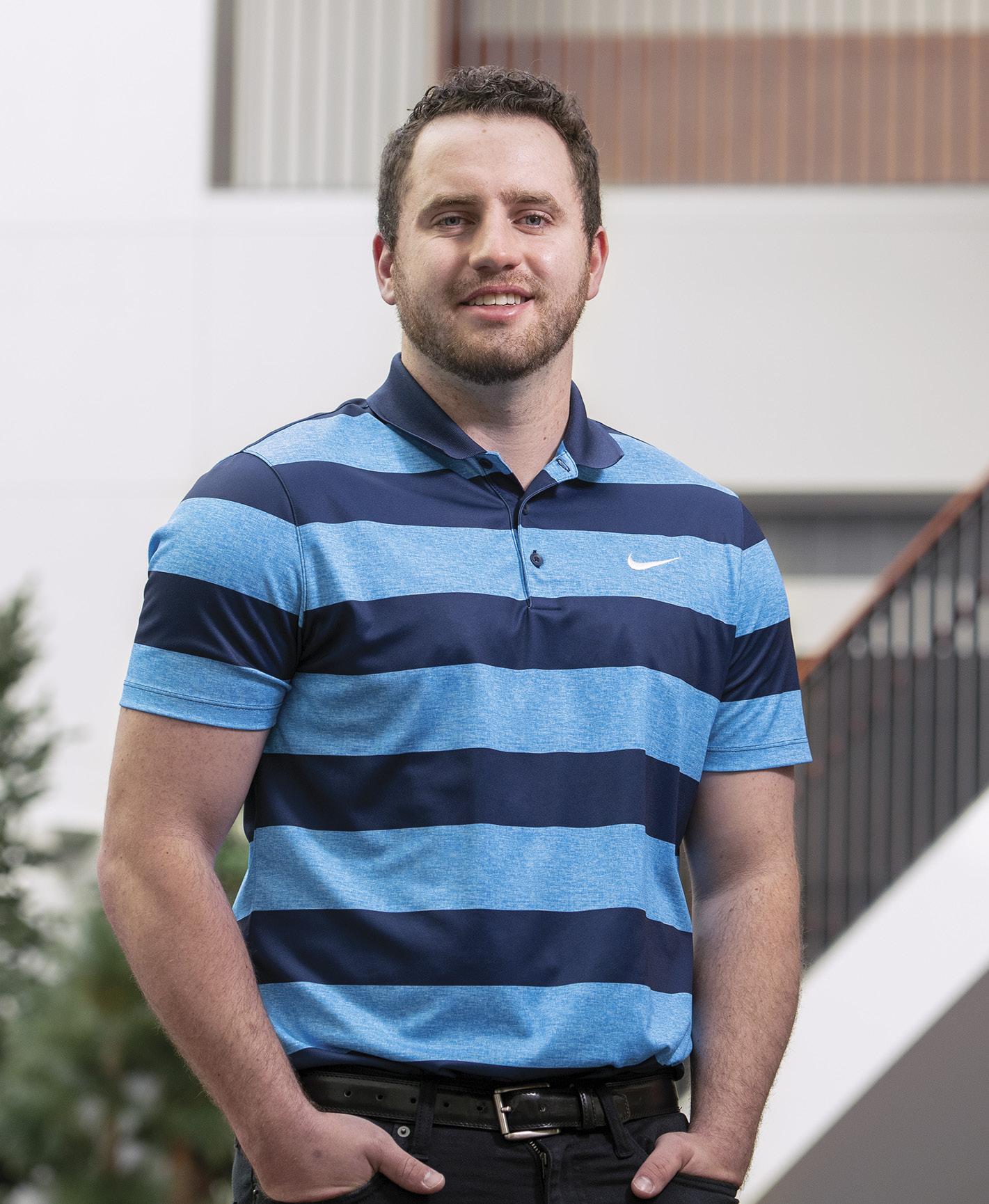
Aaron Moody, from Rapid, City, S.D., is using his Master of Business Administration (MBA) Student Leadership Award from the University of Wyoming’s College of Business as a stepping stone to further his career goals.
The award is presented each year to a first-year, full-time MBA student in recognition of leadership, mentorship and service contributions to his/her cohort and the College of Business MBA Program. The honor is contingent on the student agreeing to serve as a student liaison to the College of Business Advisory Board (COBAB) in the following academic year. Moody began those duties last March.
Nominations for the MBA Student Leadership Award come from first-year, full-time MBA students in the program.
“Receiving this award opened up a lot of relationships to me,” Moody says.
He sat in on the advisory board meetings for a year, and it enabled him to “meet a lot of very influential people.”
“My favorite memory is going to dinner after a COBAB meeting and hearing some of the members talk about the Wyoming-Norway connection,” Moody says.
Throughout the 1960s and 1980s, there were often 60-100 Norwegian students at UW at any given time. In an effort to reconnect with these alumni and create partnerships to welcome more Norwegian students, as well as to enhance UW’s education-abroad programming in Norway, a delegation of UW leaders visited Norway two years ago, including College of Business representatives.
The Association to Advance Collegiate Schools of Business International accredits UW’s College of Business MBA Program. It offers both on-campus and online degree opportunities. The cohort-based, lock-step program is designed to provide team building, networking and careerbuilding opportunities for students.
Moody says his background in various leadership roles helped shaped his success through UW’s MBA Program.
“I have always been drawn to leadership positions when it came to my personal life and in school,” he says. “I was a football captain in high school, and I led many projects during the MBA program. I would often be one of the main voices that communicated concerns or questions to the faculty.”
He took the leadership role for his group’s summer internship for ONYX Data Solutions in Laramie.
Moody also singled out Benjamin Cook, the College of Business MBA Program director, who began his duties last August, as one of his faculty mentors.
“I am grateful for Dr. Cook and all he has done for our cohort in the little free time he has,” Moody says.
Moody received his undergraduate degree from UW, majoring in civil engineering. He chose Wyoming because of the many outdoor activities in the area that he enjoyed back home in the Black Hills when he was younger.
Moody chose to pursue his MBA because of the desire to better understand the business side of the world.
“Engineering focused on technical skills, and I wanted to become more diverse and well-rounded,” Moody adds.
He will graduate this spring and plans to join an engineering firm in Dallas, Texas, and to “escape the cold for a while.”
College of Business Preserves Undergraduate and MBA Experience During Pandemic
Members of the 2020-22 MBA Cohort and COB faculty pose for a photo in the Wind River Mountains this past August.
Needless to say, COVID-19 has significantly altered the traditional college experience for students in the University of Wyoming College of Business (COB). From taking classes through Zoom to being limited to congregating with fellow students on their own residence hall floors, their lives have been turned upside down.
Still, considering the circumstances, the COB has worked to make the undergraduate student experience as normal as possible.
“Students’ minds were elsewhere this year and it’s hard to argue with that. They were thinking about trying to be safe, happy, healthy, their families, etc. and the shift to online learning was challenging for many students, at least initially,” says Steve Russell, assistant dean in the College of Business and director of the Peter M. and Paula Green Johnson Student Success Center. “Because their focus was elsewhere, not all students took advantage of the services we provide whereas, normally, they would engage with us in much greater depth for things like connecting with employers for internships or full-time jobs or how to plan a study abroad into their course schedules, etc.”
Through the Peter M. and Paula Green Johnson Student Success Center (GJSSC), Russell says COB advisers are experts with respect to specific majors.
“So, students always know exactly who their adviser is and how to get a hold of them,” Russell says. “In addition to ensuring opportunities for students to meet with us via Zoom, we also provided an online scheduling system so that students could choose what time worked best for them to meet with an adviser.”
The new physical space for the Green Johnson Student Success Center will be situated over 12,500 square feet on the first floor of the old Commerce and Industry Building, and will provide COB students with a complete academic, engagement and professional development experience, producing a channel of students who are prepared to succeed in their chosen fields and realize a positive return on their education. Renovation is expected to be completed April 1. The Green Johnson Student Success Center currently has a temporary location in lower level one of the COB.
“The Green Johnson Student Success Center is one of an extremely limited number of student success centers in business schools around the country,” Russell says. “With extremely high expectations surrounding the career placement of business students these days, our ability to leverage having career advising and academic advising under one center is very helpful for ensuring students are prepared for their next steps after graduation.”
The COB has an assistant director of academic advising and four professional academic advisers who are trained to conduct the entirety of advising for all undergraduate students. Business majors are required to have an advising appointment at least once per semester but, often times, students frequently check in to discuss long-term planning, study abroad and career readiness, Russell says.
“We also use a trained set of students that we refer to as advising assistants,” he adds. “Those advising assistants held on-demand opportunities for students to drop in via Zoom each day to ask any questions they needed regarding processes, timelines or next steps they need to take.”
Additionally, business students also have on-demand access to trained students workers, called career peers, who

Members of the 2018-2020 MBA Cohort visit the Audi AG Factory in Neckarsulm, Germany, in November 2019, as part of an International Business Experience trip.
“I believe the majority of UW students have proven, throughout the pandemic, that they can adapt to challenging circumstances.” – Ben Cook

focus on professional development, resume reviews and interview preparation. Along with the career peers, the COB has a coordinator of career advising and an assistant director of career services – both of whom see students for career advising appointments regularly.
“I think students did a great job of focusing on school and getting through a challenging year,” Russell says. “Most of what they are doing now is very last-minute but, because of the resources we have through the GJSSC, we are able to support them even in crunch time.”
MBA Students Face Challenging Circumstances
Like their undergraduate counterparts, students in the MBA program have faced their fair share of challenges this past summer and fall, yet persevered during these trying times.
Some projects under the MBA Summer Project Program had to be revised into a virtual format while others were no longer feasible or placed on hold during the pandemic. The traditional Executive Speaker Series, a staple since 2012, moved to Zoom sessions every Friday. The Outdoor Leadership Experience, an introductory hiking event in the
Wind River Mountains, for incoming MBA students, originally included 19 students ready to hike and develop leadership skills that August day. In the end, only six students got the opportunity to enjoy that experience, as all COVID tests results did not come back in time to clear all of the students for a safe wilderness experience.
And, unfortunately, not all MBA programs were able to move forward in an altered or virtual format.
“With the MBA program, in particular, several of our flagship experiences were either canceled or substantially modified,” says Ben Six members of the 2020-22 incoming MBA Cohort prep for their Outdoor Leadership Experience in August 2020. Cook, director of the MBA Program and interim associate vice provost for digital, distance and online Executive Speaker Series for our Online MBA students in programs. “We were able to adjust for the summer projects, Spring 2021,” Cook says. “I expect going forward, even after Executive Speaker Series and Outdoor Leadership Experience. the pandemic, the Speaker Series will be a mix of in-person and However, our Jackson Leadership Conference for summer virtual engagements. 2020 and International Business Experience trips we were • The MBA Program is working on virtual international planning to China and Germany both had to be canceled.” collaborations until the international travel restrictions are
Despite obstacles presented by COVID, there were still lifted, both on the U.S. and foreign destination sides. a number of highlights: • Remaining students, who did not get to participate in the • Virtual projects in summer 2020 included work with leadership hike last August, will have a second chance at the Onyx Data Solutions, a local Laramie company. This project experience this August. focused on a “go-to-market” strategy for a new product And, of course, there were adjustments with teaching and offering as part of their technology consulting and IT attending MBA courses. services. The other project was assisting Integrity RX LLC, a “Some challenges are endured more than they are overcome. pharmacy brokerage and consulting firm, in the development The majority of our traditional students or faculty ‘signed up’ of data tools and valuation modeling. for virtual delivery of education,” says Cook, who also is an
For summer 2021, the COB will take a hybrid approach associate lecturer of economics. “There is so much richness where students can secure internships or participate in one and engagement and hallway conversations and connections of the MBA Summer Projects. Several students have already that happen on a bustling campus. You can feel the energy at a secured internships, Cook says. university when school is in session and the campus is buzzing.”
“And I think we are going to get some great projects this All in all, Cook says the students handled the situation well. year for those that prefer the consulting engagement,” he adds. “I believe the majority of UW students have proven, • The MBA Program transitioned almost seamlessly throughout the pandemic, that they can adapt to challenging to Zoom delivery of the Executive Speaker Series, which circumstances,” Cook says. “That being said, many programs, continues to run every Friday. Much like the summer projects, including the full-time campus MBA program, are designed delivering the series virtually has some advantages as it reduces with several engaging experiences that have had to be canceled the time and expense of speakers traveling to Laramie, and or transformed for the current environment. The hardest hit widens the net of leaders that can be recruited to engage with experiences have been to our international programs that are UW business students. part of the College of Business strategic plan.”
“With that success, we are working on launching an

UW College of Business to Open Expanded Student Success Center This Spring
Creating a strong support system for tomorrow’s business Medallion Service Award as a couple in 2014 and Paula leaders is the impetus behind a plan to renovate the Peter M. received an honorary doctorate in 2017. and Paula Green Johnson Student Success Center within the Following Peter serving as the first executive in residence University of Wyoming’s College of Business (COB). at the College of Business in 2004, the idea emerged to create
The Green Johnson Student Success Center, situated over a specific resource for business students dedicated solely to 12,500 square feet on the first floor of the old Commerce preparing them for, and securing, jobs. In 2007, the couple and Industry Building, will provide COB students with donated $1 million, which was matched by the state of a complete academic, engagement and professional Wyoming, to endow the Career Center, which assists business development experience, and produce a channel of students students with comprehensive career planning services that who are prepared to succeed in their chosen fields and realize start at the very beginning of the student’s college journey. a positive return on their education. In 2019, the idea to build off the Career Center and
The center, which entails a restructure and renovation, will robustly integrate COB services in enrollment, academic include a dedicated entrance with an inviting floor plan and advising and career services emerged. From this, the vision to UW branding; a reception and common area for students to create a new organizational structure of the center and the learn, collaborate and network; flexible office space for staff services offered was born, as was the opportunity to create and students; interview rooms; and a technologyrich CASE room for companies to engage with students. Renovation is expected to be completed April 1. The Green Johnson Student Success Center currently has a temporary location in lower level one of the COB.
“The Green Johnson Student Success Center is one of an extremely limited number of student success centers in business schools around the country,” says Steve Russell, assistant dean in the College of Business and director of the Student Success Center. “With extremely high expectations surrounding the career placement of business students these days, our ability to leverage having career advising is very helpful for This rendering of the Lois C. Mottonen Student Commons is one component of the Peter M. ensuring students are prepared for their next steps and Paula Green Johnson Student Success Center within the University of Wyoming’s College after graduation.” of Business. Renovation of the center is expected to be completed April 1. RENDERING BY THE DESIGN STUDIO INC.
The Student Success Center will serve the college’s approximately 1,400 students with the following a physical home for this newly restructured team. The team fundamental student services: enrollment management, currently includes 10 full-time employees overseen by Russell. student recruiting, scholarship distribution, academic The Student Success Center already has secured $3.5 advising, study abroad advising, internship support, career million of private support to fully fund the renovation services and employer engagement. project. This includes a leadership gift from the Johnsons; the
Peter Johnson, the president of Sinclair Oil Corporation McMurry Foundation endowment; and a gift from the estate and based out of Salt Lake City, received his bachelor’s degree of Lois Mottonen, a UW alumna and accountant. in finance from UW in 1972. Paula Green Johnson earned “As support for this project continues to grow, there will be her bachelor’s degree in speech pathology and audiology from some amazing opportunities for philanthropic gifts to support UW, also in 1972. She worked as a court reporter in Denver new and exciting programming,” Russell says. “We’ve only and Salt Lake City. just seen the tip of the iceberg in the amount of engagement
Peter and Paula have been incredibly supportive of UW opportunities we have for our students, and I’m excited to and their community. Recognizing their commitments to see them expand with the help of our alumni and corporate UW and they community, the were honored with the UW partners.”

College of Business Launches HOSPITALITY, LEADERSHIP MINORS
Wyoming’s second-largest industry and future University of Wyoming graduates will benefit from a new minor in hospitality business management offered in UW’s College of Business.
Additionally, the college has created a new leadership minor aimed at preparing students to be leaders in every facet of their lives.
Launched during the fall 2020 semester, the minors represent the college’s commitment to give its graduates practical skills that can be put to use in the business world, while contributing to the economic vitality of Wyoming and beyond.
“We’re excited about these new minors and the opportunities they will provide for our students,” College of Business Dean Dave Sprott says. “They also promise to help us produce graduates who will be even more prepared to contribute to the state’s economy, their employers and their communities.”
HOSPITALITY MINOR
The hospitality business management minor – which will serve as the foundation for eventual creation of a bachelor’s degree in the field – has been developed in collaboration with Wyoming community colleges, Wyoming’s Office of Tourism and industry partners. Other collaborators are UW’s Haub School of Environment and Natural Resources and Department of Family and Consumer Sciences.
The minor includes new hospitality courses delivered through the College of Business, in addition to interdisciplinary electives offered at UW and through the state’s community colleges. Student accessibility is a priority and, to this end, some electives are available online.
The new minor complements the outdoor recreation and tourism management degree launched in 2018 by the Haub School and the College of Business.
Wyoming’s hospitality and tourism industry was responsible for generating $3.9 billion in visitor spending and $203 million in state and local tax revenues in 2019. Additionally, the industry generated more than 32,480 jobs.
“We are thrilled to see this important degree program continue to grow and evolve,” says Chris Brown, executive director of the Wyoming Lodging
and Restaurant Association and the Wyoming Travel Industry Coalition. “The addition of the hospitality business management minor will strengthen our state’s second-largest industry by educating the next generation of hospitality industry leaders.”
“We are thrilled to see UW’s College of Business provide such an innovative program to educate Wyoming’s next generation of hospitality and tourism professionals,” says Diane Shober, executive director of the Wyoming Office of Tourism. “The addition of hospitality education has been something our industry has long awaited. Bolstering this industry will be vital in strengthening and diversifying our local and state economies going forward.”
Industry and community college partners have been at the table during program design as the College of Business not only considered course content, but also opportunities for statewide industry engagement such as on-site projects – and internships that lead to addressing the current shortfall in filling hospitality positions requiring a bachelor’s degree.
Steve Farkas, assistant dean for the College of Business, says market research revealed that students are leaving Wyoming to complete their hospitality management education beyond an associate degree, and they often do not return. Of the more than 350 prospective students surveyed, 80 percent expressed interest in staying in the state to work if they were to pursue a degree at UW in either hospitality management or outdoor recreation and tourism.
“We also learned through our market analysis that, of the almost 400 hospitality management positions advertised last year in Wyoming, a significant percentage required a bachelor’s degree,” Farkas says.
LEADERSHIP MINOR
Meanwhile, the leadership minor is a unique curricular and co-curricular experience that helps students acquire the knowledge and experience necessary to develop leadership competencies. Required courses include “Foundations in Leadership” and “Business Ethics” classes, and students select two electives from a list of 21 other courses. A capstone project, in which each student leads a large-scale project involving others, also is part of the curriculum.
Students in the leadership minor are expected to complete the Cowboy Leadership Badge by participating in campus and community activities outside the classroom, such as attending designated campus events and taking part in service projects.
“The point of the leadership minor is to help UW students become leaders – first as students on the UW campus and, subsequently, in their professional organizations and communities,” says Chase Thiel, associate professor of management in the College of Business and sponsor of the leadership minor. “For this to happen, their leadership education must involve more than just learning leadership theory. They must have opportunities to put those theoretical principles into practice.”
A NEW KIND OF EDUCATION
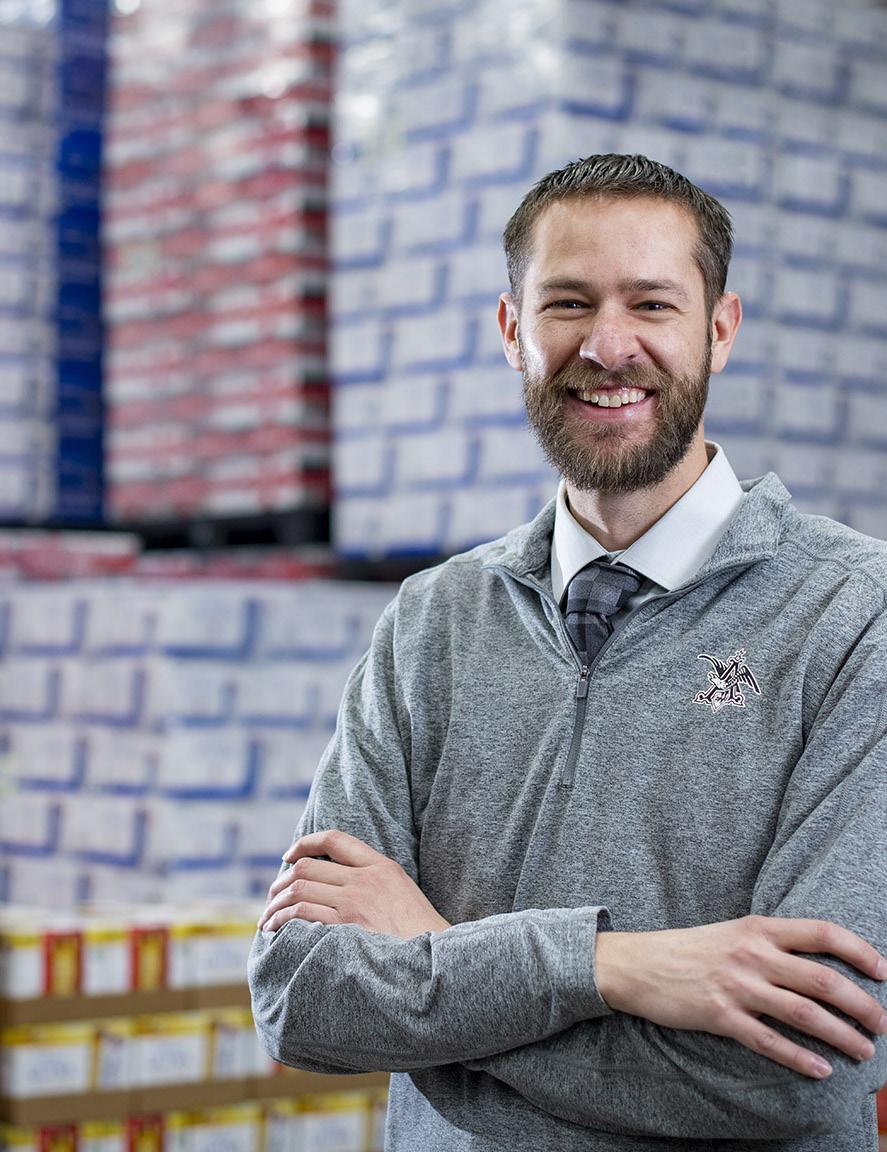
When the COVID-19 pandemic hit the United States in 2020, College of Business Advisory Board Member and Western Wyoming Beverages Inc. President Sean Valentine quickly adjusted business operations at his facilities to ensure the safety of his employees and customers.
In the midst of COVID-19, College of Business Advisory Board members have seen the nature of their businesses change, and they’ve changed with it.
Sean Valentine has spent nearly 20 years involved in small business. In that time, he has grown and learned what it takes to be successful. But like many others, March 2020 forced him to look at his workplace in a different light.
The COVID-19 pandemic prompted a nationwide shutdown of businesses. In the months that followed, even as operations ramped back up, measures had to be implemented for the safety of workers and customers. Traditional delivery of goods and services was disrupted, and the “old way” of doing things just wouldn’t cut it.
Three University of Wyoming College of Business Advisory Board members used their experience and creativity to navigate the new normal.
Growing up in Rock Springs, Wyo., Sean Valentine knew early on where he wanted to attend school. As someone who says he “bleeds Brown and Gold,” he graduated from UW in 2012 with a degree in marketing and minor in accounting, and earned a master’s in business administration the next year.
He now is the president of Western Wyoming Beverages, which sells and distributes Pepsi and Budweiser products, as well as beverage products from about 30 other suppliers.
“I really grew up in it, the way most people do with a family business,” he says. “From the time I can remember, I was spending time with my parents at their job at Western Wyoming Beverages.”
As soon as he turned 14, he used a restricted driver’s license to work in the warehouse. When he was 18, he tested for his commercial driver’s license to drive delivery trucks. His summer breaks in college involved running a sales route for the company. Growing up in his family’s small business meant he pitched into about every facet of the operation. Valentine embraced the opportunity, saying it’s the primary reason he occupies the position he has today.
None of that experience, however, prepared him for a global crisis.
“COVID-19 has been a whirlwind for our business,” he says. “First and foremost, the care and health of our employees has been our priority. We immediately implemented social distancing and mask policies to try to do anything we could to protect our team. We’ve implemented a rigorous internal contact tracing and testing policy. While we have not been immune to having our team affected by COVID-19, I truly believe we’ve done everything we can to care for and protect them.
“Beyond our team, the implications on our business have been trying. We went from having almost all of our on-premise accounts close overnight and the issues that came with that, including aging beer kegs that we had to throw away because they were all out of date, a shift to consumers buying more at-home packages such as 12-ounce aluminum cans, and the resulting national shortage on aluminum cans. Just when we think we’ve got it figured out, we’ve been thrown for another loop.”
Despite the challenges for Western Wyoming Beverages, Valentine still makes time to serve on the COB Advisory Board. He is the vice-chair of the subcommittee leading statewide outreach and economic growth for Wyoming, and he hopes to develop the next generation of business leaders in the state.
“I’m brand new to the College of Business Advisory Board, which brings its own unique challenges and opportunities,” he says. “I get to see things out of a lens that many of the people on the board with more experience don’t get to see, which adds value. I also have a unique perspective as a more recent graduate of the College of Business that allows me to relate closely with the student experience and faculty research that is taking place.”
Sean Valentine
President of Western Wyoming Beverages
Ann Nelson
Regional President, Western States Bank
Banking wasn’t part of the plan for Ann Nelson. She enrolled at UW in the nursing program, and studied for three-and-a-half years until she ran into financial constraints. She changed her major, and the course of her career. She graduated in 1986 with a degree in business management and accounting. As the oldest of four siblings growing up in Bellevue, Neb., Nelson watched her father run several small businesses.
“I learned at an early age by watching him that integrity, hard work, attention to detail and people skills lead to a satisfying and successful business and career. That had a big impact on me and how I view and value life,” she says.
Nelson now lives in Cheyenne, Wyo., and as a regional president for Western States Bank for the last three years, she oversees seven offices in Colorado and Wyoming. She has certainly worked her way
up, starting out as a management trainee for First Wyoming Bancorporation. Over the two-year trainee program, she learned bank auditing, operations and lending. She and her husband lived around the state, including Saratoga, Cheyenne and Cody. She took a commercial lending position and later, a branch manager role in Green River.
A promotion led her to Colorado as the bank expanded operations, but she wanted to return to Wyoming, and accepted a bank management and lending role at another financial institution in Laramie. She continued her banking career arc with an executive bank position in Cheyenne for a large regional bank. Nelson then left banking entirely for three years thinking to try something different in the education sector, raising corporate funds for the local community college.
“Somehow, the challenge of banking and financial problem solving lured me back,” she says.
Her problem-solving skills were put to use because of COVID restrictions. All branch lobbies were initially closed for nearly two months at the height of the pandemic, and it became more important to connect with customers in other ways. “We immediately reached out to our customers to help them use our electronic and digital tools, along with our bank drive-ups to meet their banking needs,” Nelson says. “We also spent long hours helping business customers with the Paycheck Protection Program offered through the CARES Act. When customers wanted to meet in person, we arranged virtual meetings via video to maintain that personal relationship with them.” She adds that Western States Bank lobbies have been open since May 2020 for in-person traffic, observing stringent health protocols to keep customers and staff safe and healthy while providing service. Nelson serves as a board member for the College of Business Advisory Board and vice-chair for a sub-committee addressing strategic plan initiatives, specifically growing the quality and reach of online programs. Nelson also mentors business students.
“I’ve seen what a difference having access to an affordable, quality public education has made in my life,” she says. “I want to help provide that same opportunity for others. We have a rich resource in UW that we need to continue to promote to all.”

PHOTO COURTESY OF ANN NELSON
PHOTO COURTESY OF BRANDY MARROU
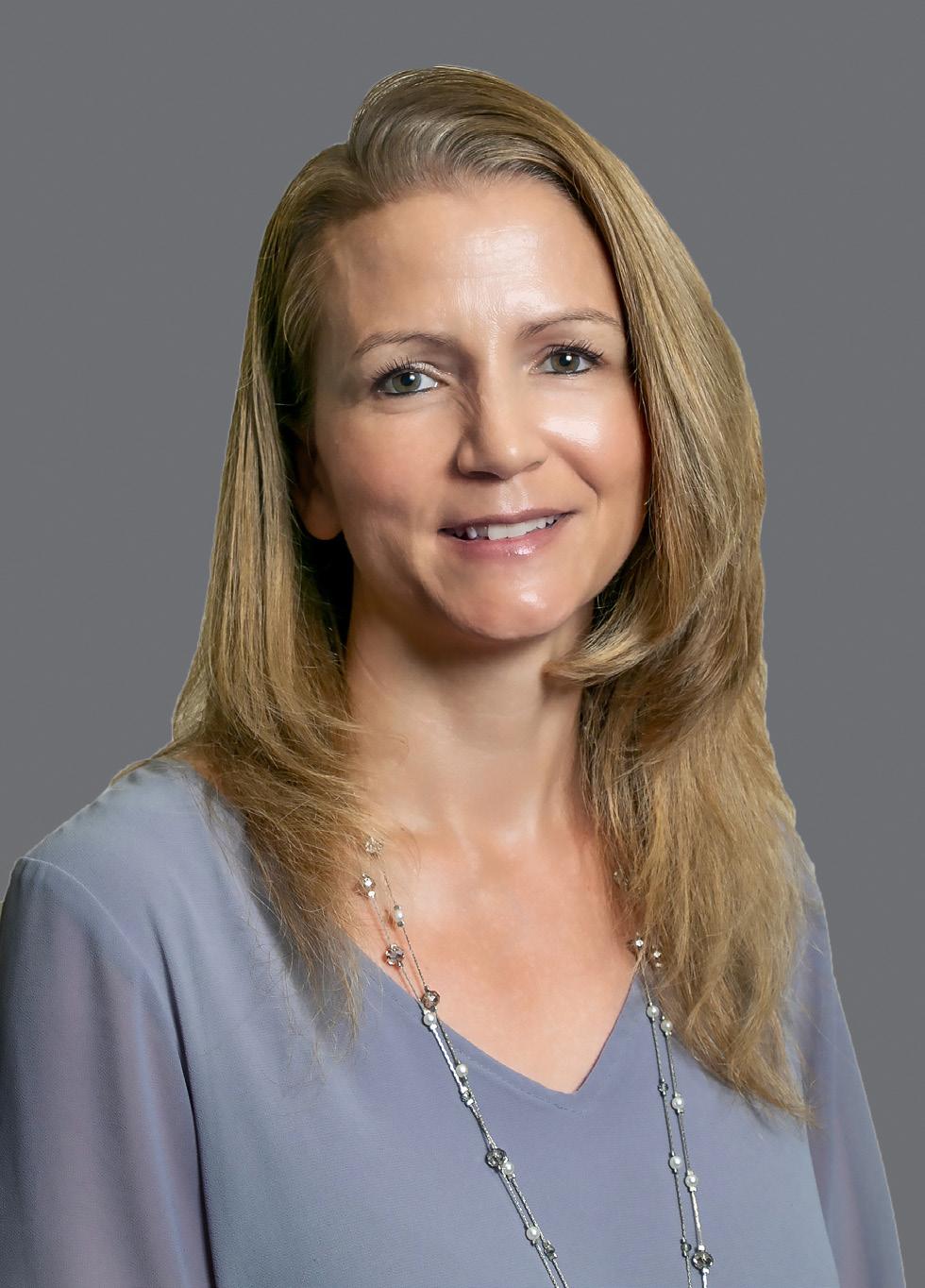
Brandy Marrou
Partner in McGee, Hearne, & Paiz Accounting Firm
From an accounting firm perspective, the COVID-19 shutdown hit during the peak of tax season. Spring is a busy time of year for Brandy Marrou, so when infection numbers spiked, she and the other partners at the accounting firm of McGee, Hearne, & Paiz, LLP (MHP) had to switch tactics, quickly.
“The most challenging aspect for me personally was trying to balance the needs of our clients with those of our staff and their families, as well as my family,” she says. “Our clients looked to us to assist them in gaining access to federal relief programs, the guidance for which was changing on what seemed like a daily basis. Funding was limited and was being awarded on a firstcome, first-served basis.”
MHP, based in Cheyenne, Wyo., was wellpositioned from a technology standpoint to allow employees to work from home. The firm’s priorities shifted to addressing the time-sensitive needs of clients resulting from COVID, while also maintaining historical accounting services and deliverables. Like many, Marrou’s challenge included prioritization of work tasks while home-schooling two children.
“How did we handle COVID-19 in terms of business operations? One day at a time,” she says. “We communicated frequently both with our clients and our staff, we practiced empathy and grace, and we came to the realization that each day would be fluid. Our partner group met frequently and was constantly sharing and disseminating information.
“I often joked that no one gave me a book on how to deal with a pandemic when I was offered partnership. Knowing how to revise business processes to adapt to the challenges presented by COVID-19 was uncharted territory. We certainly didn’t get things right on the first try, but when we stumbled, we got back up and did our best to do it better the next time.”
Originally raised in Dubois, Wyo., she graduated from UW in 2000 with degrees in accounting and finance with honors. She began her career as an audit associate and became a licensed certified public accountant in 2003. Her strong work ethic and ability led to her becoming the managing partner of MHP.
Perhaps owing to the fact she has been mentored “by some of the most amazing people over the past 20 years,” Marrou is generous with her time. She has been involved with organizations such as Funding the Future, K9’s 4 Mobility, Cheyenne LEADS and United Way of Laramie County.
She’s been on the COB Advisory Board since 2012. She says her role since then has been to enrich student experiences to ensure a quality education. As a member of the Academics Committee, she was involved in the COB’s last two accreditations with the Association to Advance Collegiate School of Business (AACSB), an industry standard of excellence achieved by just 882 business institutions in 57 countries.
Marrou adds she believes it is important to continue to look for ways to instill in UW students the characteristics intrinsic to successful business leaders, including problem solving, communication, time management and leadership.
“The University of Wyoming College of Business and its faculty are the foundation of my career, and I was honored to be given the opportunity to give back,” she says.
College of Business Advanced Selling Class
Prepares Students for Professional Careers
In the competitive world of selling products – whether it is local, statewide or even nationally – the name of the game is still the same: strong, professional skills are needed.
For the past two fall semesters, University of Wyoming College of Business Professor Mark Leach, the Mendicino Family Chair in Sales and Salesmanship in the Department of Management and Marketing, has taught an advanced selling class.
The course provides students an indepth study of advanced sales concepts, including relationship management, problem solving, working in complex selling situations, and using customer and market data with prospects. It also explores the use of data-based decision-making and the use of selling technologies.
“The class is designed to reinforce and enhance a student’s selling skills,” Leach says.
What makes the class enticing for students is that professional sales executives – who enable the development of valuable selling skills – repeatedly challenged them. For the past two years, professional sales team members from the NFL’s Baltimore Ravens, and Wyomingbased companies EMIT Technologies of Sheridan and Western Wyoming Beverages in Rock Springs have helped the advanced-selling students with realworld salesmanship case studies.
“Working with actual business owners/professionals gave me new perspectives on how sales are done,” says Bethany Raver, a senior in marketing, with a concentration in sales and finance, from Casper. “Before this class, I could only imagine what business-tobusiness sales could be, but in this class, I had opportunities to practice sales with real business cases and with the people from these cases.”
The course employs a number of complementary methods through a combination of lectures, case discussions, exercises and activities – both inside and outside the classroom.
“The course is designed to provide a student with numerous

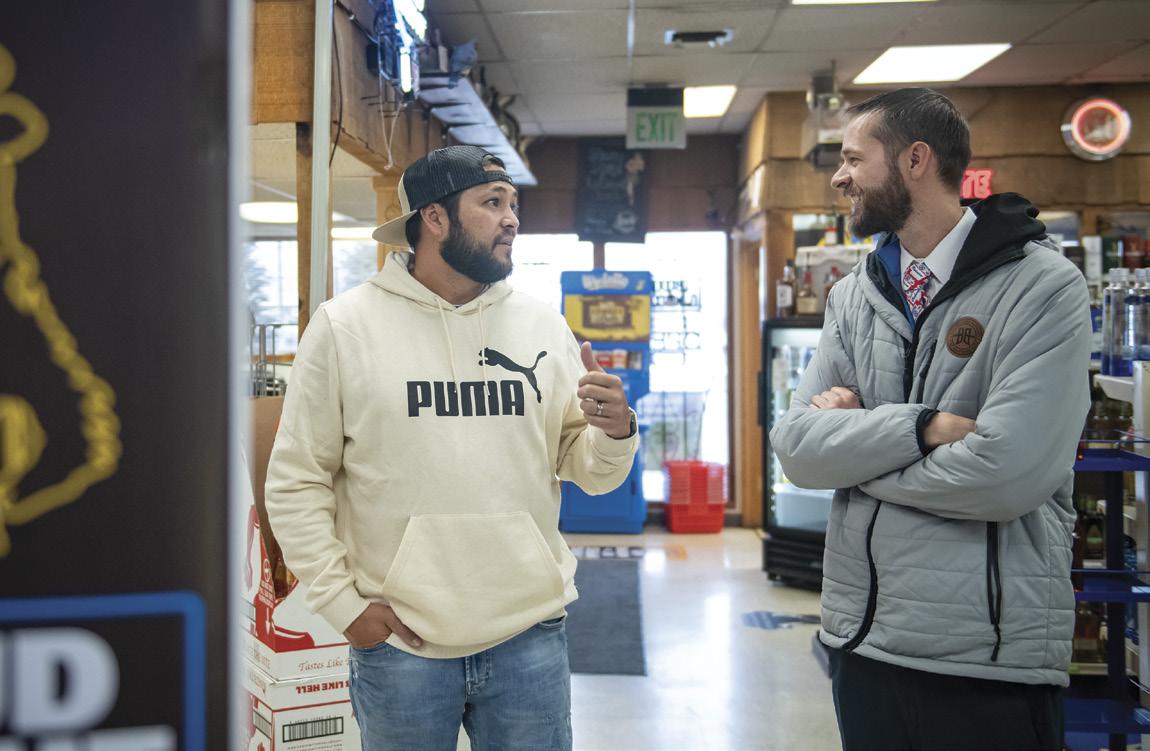
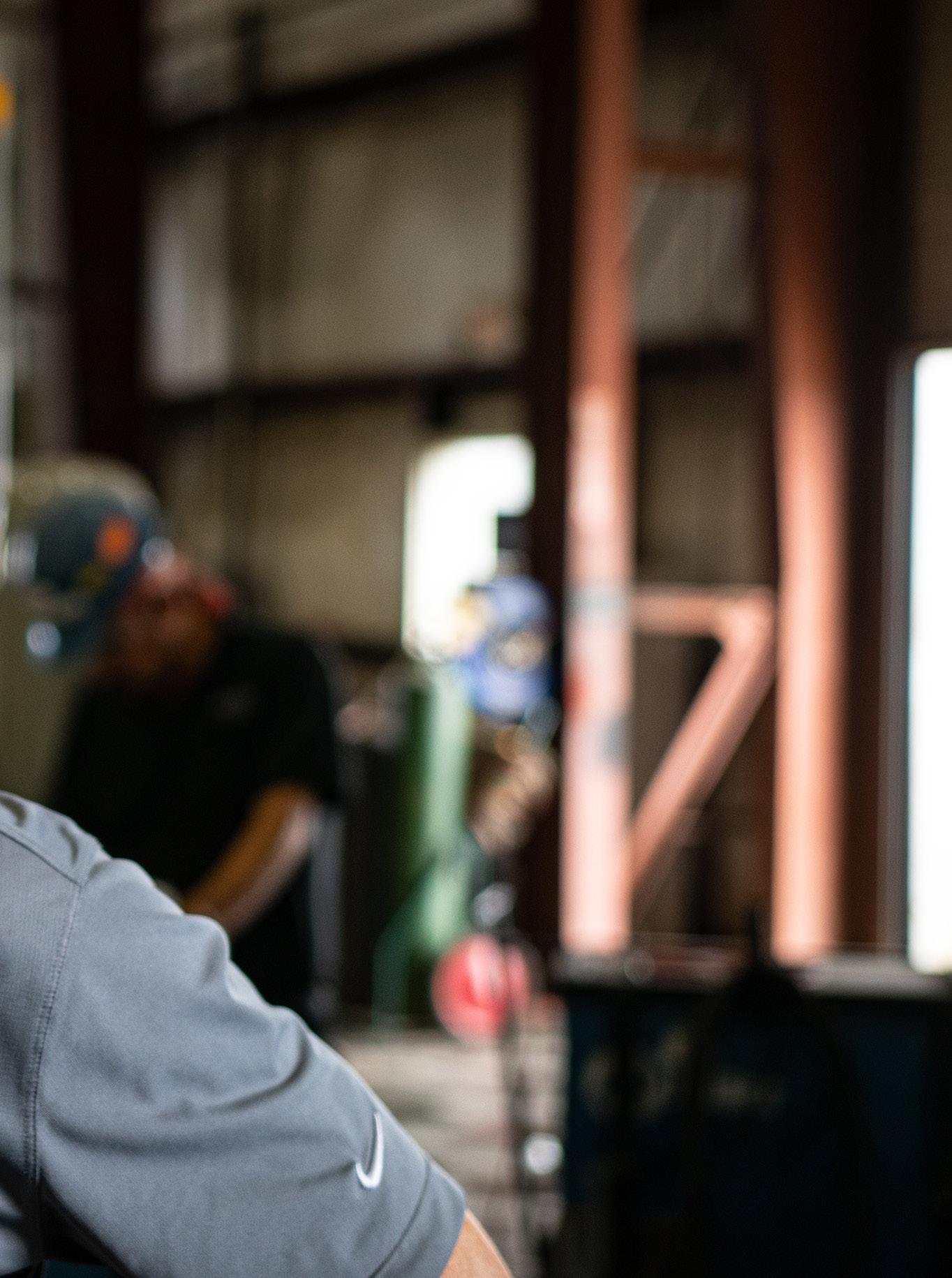
UW alumnus Sean Valentine, the President of Western Wyoming Beverages in Rock Springs, helped to provide real-world experience for University of Wyoming students as they developed a plan for a sales pitch as part of a College of Business class.
Drew Druckerenmiller, the sales account manager for EMIT Technologies in Sheridan, visits one of the company’s gas compression customer sites. EMIT representatives worked with University of Wyoming College of Business advanced selling class students who received real-world salesmanship experience.
PHOTO BY MARC NOVAES
opportunities to learn, practice and demonstrate sales skills and customer account management knowledge,” Leach says.
Even though he is a kinesiology major, Austin Farkas, a Cheyenne senior, says working with actual business owners/professionals in their industries provided valuable knowledge.
“You can apply much of what we learned in the classroom to different aspects of a sale, but gaining insight into the nuances of a particular industry is something that only comes with experience,” Farkas says. “It is a humbling experience, because it really shows you how much of an expert you need to be in to effectively sell a product/service in a particular market.”
What makes the class enticing for students is that they receive valuable selling skills from the three professional business representatives.
The three selling case scenarios for the UW students were to work alongside: • The Baltimore Ravens sales team, headed by Powell native and UW graduate Kevin Rochlitz, the club’s chief sales officer. The UW students were charged with securing a new sponsorship with a local dairy store which started as an ice cream chain and now has 48 convenience stores nationwide. • Western Wyoming Beverages, headed by UW alumnus Sean Valentine, the company’s president. The UW students worked on a sales pitch to get more of the company’s beverages stocked in a large western Wyoming liquor store. • EMIT Technologies is a design and manufacturing company that helps solve problems and design solutions for natural gas compression applications. The UW students worked with the company’s sales team on the class project. For this case, students endeavored to secure business from one the largest packagers of natural gas compression units.
In each case study, UW students researched the market, developed partnership solutions and pitched these solutions in mock selling roleplays with the three company sales representative teams. These role-plays were conducted via Zoom and required students to lead the conversation and present their ideas in a polished and professional manner, Leach says.
“The involvement of these corporations is invaluable at creating student experiences that are challenging
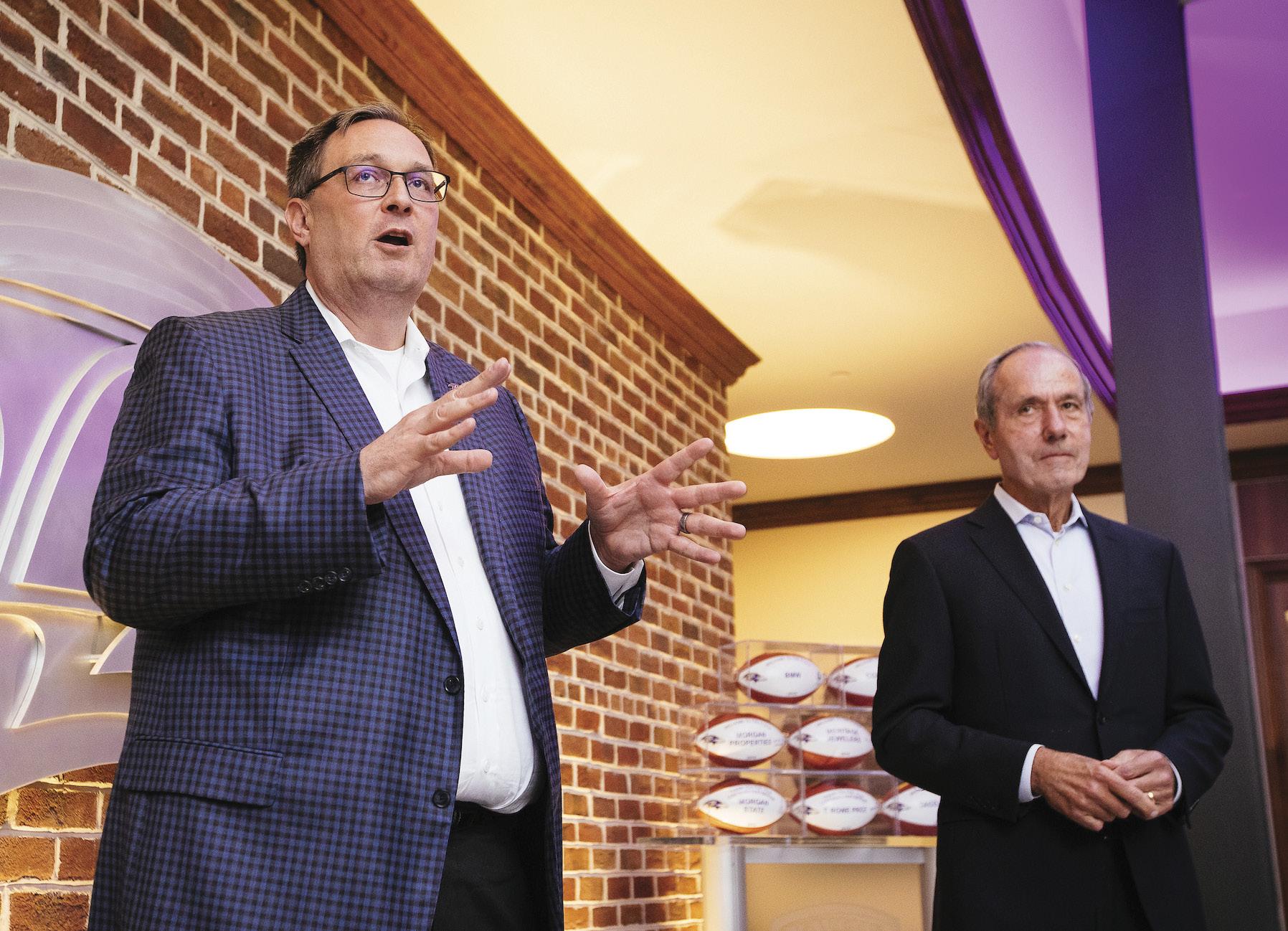
and as ‘real world’ as possible in an academic setting,” Leach says. “The opportunity to ‘sell’ to industry sales professionals motivates students to do well and provided an experience where students can test and refine skills developed in class.”
Rochlitz says he has always wanted to have his sales team work with UW students to provide them with some real-life sales experiences and expertise.
“Working with Mark Leach’s sales class has been rewarding. The presentations we observed were outstanding,” Rochlitz says. “Clearly, the sales classes are providing the students with some great education, and the presentations that we received provided my team with some new ideas to bring to clients we are pitching in the Baltimore/Washington, D.C., area. I am very impressed with the students’ sales knowledge and their openness for advice.” EMIT COO Michelle Butler says the company “was thrilled” to participate with the UW College of Business’ advanced selling class.
“As our organization continues to grow, we’re actively looking to identify a pipeline of talent that can grow with us,” Butler says. “The students in the advanced selling class exhibited professionalism and an eagerness to learn and improve their selling skills. It’s been a great program to partner with, and we look forward to continuing our relationship with the university and Wyoming’s future workforce.”
Western Wyoming Beverages representatives have worked with Leach’s students the last two semesters, and Valentine says his team wants to provide the students in the course a real-life selling experience that will help them prepare for their first careers after UW, learning how to understand and sell with data, and make data-based decisions on what to sell. Another goal working with the UW program is internally focused, Valentine says, in hopes of building a rapport and credibility with the students to recruit them down the line to work for the company as account managers.
“We have many UW alumni on our team. We all feel an immense pride in being able to give back some of our time and facilitate growth for the University of Wyoming in hopes that preparing students today will help foster and grow Wyoming’s economy in the future,” he says. “It is incredible to see the growth of UW’s Center for Professional Selling not only in the faculty and partners they’ve been able to bring on in a short amount of time, but also seeing the growth in the students from one semester to the next.”
Autumn Knight, a UW marketing senior with a sales concentration, says the course provided her the experience, exposure and confidence to tackle different forms of sales.
“It has shown me regardless of how big of the sale or the name of the company, you are still selling to people,” Knight says. “One-on-one sales with multiple companies/salespeople also taught me experienced techniques and methods that I may have never learned otherwise.”
Kade McMillan, an Upton, Wyo., marketing senior, with a professional sales minor, echoes those sentiments. He says the course is designed to learn from professionals in the business even though the three were from vastly different professions.
“The biggest takeaways that I got from this class were no matter what you are selling or who you are selling to, the processes you must take to finalize a sale remain the same,” he says. “It is important that you follow each step of the selling process to put yourself in a better position to get the sale.”
Baltimore Ravens Chief Sales Officer Kevin Rochlitz, left, a University of Wyoming business graduate, discusses the NFL club’s partnerships during a recent function along with Dick Cass, president of the Ravens. Rochlitz and his sales team worked on a case study with UW students enrolled in the advanced sales class.
PHOTO BY PHIL HOFFMAN
CONNECT WITH US ON SOCIAL MEDIA








